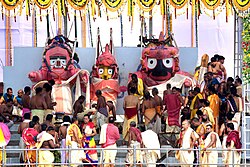| Snana Yatra | |
|---|---|
 Snana Yatra at Puri Srimandira in 2022 | |
| Official name | Snana Yatra |
| Also called | Snana Purnima |
| Observed by | Odia People |
| Significance | Birthday of Lord Jagannath |
| Date | Jyestha Purnima |
| 2023 date | 4 June (Sunda) |
The Snana Yatra (Odia: ସ୍ନାନ ଯାତ୍ରା), also spelt Snana Jatra, is a bathing festival of deities celebrated on the purnima (full moon day) of the Hindu month of Jyeshtha.[1][2] It is the auspicious birthday of Jagannath.

It is an important festival for Hindus. This is the first occasion in the year as per the Hindu calendar, when the deities Jagannath, Balabhadra, Subhadra, Sudarshana, and Madanmohana are brought out from the Jagannath Temple (Puri) and taken in a procession to the Snana Bedi. There they are ceremonially bathed and decorated for a public audience with the devotees.[3]
Religious significance[edit]
It is a belief among devotees of Lord Jagannath that if they make a pilgrimage to see the deity on this day, they would be cleansed of all of their sins. Hundreds of thousands of devotees visit the temple on the occasion.[4] The Skanda Purana mentions that King Indradyumna arranged this ceremony for the first time when the idols of the deities were first installed.

Ceremonies conducted[edit]
On the eve of the Snana Yatra (which means the Divine Bathing festival, in Sanskrit), the idols of the deities are brought out in a grand procession from the garbhagriha (sanctum sanctorum) to the Snana Bedi (bathing platform). Devotees come to view the deities.
On the day of the Snana Yatra, the deities are bathed with 108 pots, of ritually purified water drawn from the northern well of the temple to the accompaniment of religious incantations.[5] In the evening, at the conclusion of the bathing ritual, Jagannath and Balabhadra are dressed up in elephant headgear representing the God Ganesh. This form of the God is called the 'Gajavesha'.
After the Snana Yatra the Gods are traditionally believed to fall ill and are kept in a sick room to recuperate in privacy under the care of the Raj Vaidya.[6] During this period known as Anasara the Gods cannot be seen by devotees. At this time three pata chitra paintings are displayed for devotees to view instead It is said that with the Ayurvedic medication ('pnachan') administered by the Raj Vaidya the Gods recover in a fortnight and resume giving an audience to their devotees.[7]
During the Anasara period devotees head to the Alarnatha Mandira in Bramhagiri in the belief that Jagannath manifests as Alarnatha during this period[8]
References[edit]
- ^ "Lavish bath before sickroom stay". telegraphindia.com. 2013. Archived from the original on July 2, 2013. Retrieved 25 June 2013.
The festival is observed on the full moon day of the Odia month of Jyestha
- ^ Chakraborty, Yogabrata (28 June 2023). "পুরীধাম ও জগন্নাথদেবের ব্রহ্মরূপ বৃত্তান্ত" [Puridham and the tale of lord Jagannath's legendary 'Bramharup']. dainikstatesmannews.com (in Bengali). Kolkata: Dainik Statesman (The Statesman Group). p. 4. Archived from the original on 28 June 2023. Retrieved 28 June 2023.
{{cite web}}: CS1 maint: bot: original URL status unknown (link) - ^ The official website of the Puri Jagannath temple [1] Archived 2011-02-02 at the Wayback Machine.
- ^ "Lakhs witness deities' bathing ritual in Puri". Hindustan Times, Delhi. 15 June 2011. Archived from the original on 8 March 2016. Retrieved 2 September 2012.
- ^ Mohanty, Rajkumar (2013). "Ceremonial bath over, lords retire to Anasar Ghar - The New Indian Express". newindianexpress.com. Archived from the original on 8 December 2015. Retrieved 25 June 2013.
they were bathed with 108 pitchers of aromatic and herbal water
- ^ Mohapatra, Debabrata (2011). "The skies rain down for divine bath". The Times of India. Archived from the original on 28 September 2013. Retrieved 25 June 2013.
would undergo treatment by the shrine vaidyas (ayurveda doctors) for 15 days,
- ^ "Details of the ceremony". Archived from the original on 2009-01-05. Retrieved 2009-01-27.
- ^ "Rath Yatra: Snana Purnima Likely To Be Held With Minimum Servitors". ODTV. Retrieved May 21, 2020.[permanent dead link]
